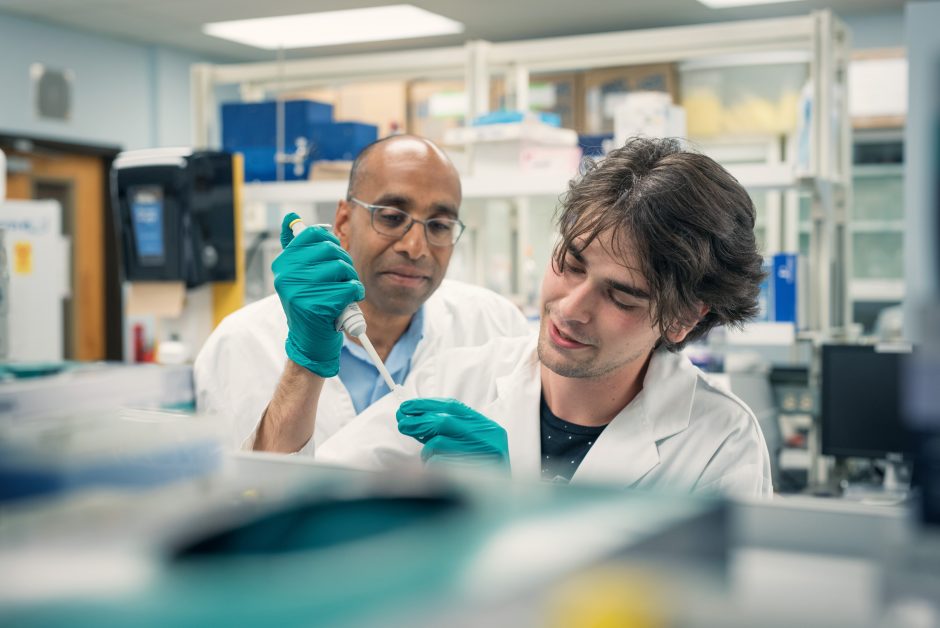
George Kachkovski (front) with Dr. Kiran Soma in the Soma Laboratory
Most people don’t like hospitals, let alone enjoy them—but George Kachkovski isn’t like most people. He likes the buzz of the energy and research taking place in hospitals.
This led him to pursue his Bachelor of Science in Nursing at UBC’s School of Nursing after graduating with BA Hons in Psychology from UBC in May 2018. Kachkovski said his experiences as a psychology student and researcher has “taught me how to find evidence, and evaluate it, which is an important part of being a nurse.”
We asked Kachkovski to reflect on his time as a psychology student and how it influenced his career path.
What is your degree and what year did you graduate?
I finished my BA Hons. in Psychology, with a minor in Microbiology and Immunology in May 2018.
What are you doing now?
I’m a nursing student at UBC and residence advisor in Walter Gage. I also continue to be involved in research in the lab of Prof. Kiran Soma.
What made you decide to move into the field of nursing?
I very much enjoyed what I was studying and researching, but I wanted to extend that into a practical skill. I also really enjoy hospitals; I love the energy, the research, all the cool things that are going on every day. All of this naturally brought me to nursing.
How does psychology help you as a nursing student?
Psychology and psychology research has taught me how to find evidence, and evaluate it, which is an important part of being a nurse. It has also taught me to never look at people in a vacuum, but to explore the variety of factors that may be influencing them. Finally, psychology has taught me useful bits of practical knowledge about how to improve team dynamics, and how to approach people in distress.
Why did you choose to study psychology at UBC?
I chose UBC because I had specifically wanted to study psychology, and I knew that UBC had a strong tradition of psychology research. I discovered a YouTube video of Dr. Michael Souza giving a lecture on the psychology of Gambling, which really captivated me, and pushed me to visit Vancouver. When I finally visited the campus, I fell in love, and became totally invested in the idea.
Was there anything or anyone who inspired you, during your time as a psychology student?
There are so many passionate people at UBC and in this department. As I had mentioned, I was initially inspired to come here because of a lecture by Dr. Michael Souza. I ended up taking several courses with him and have gotten to know him well. His passion for psychology inspired me to always look for something exciting in anything I am studying, and he personally opened several important doors for me. I eventually got a chance to work with other professors, including Prof. Alan Kingstone and Prof. Kiran Soma, who all continued to foster my curiosity, and provided me with opportunities to explore my interests and build on my skills.
On top of that, I have met so many passionate friends who inspired me to further extend myself by taking on research, leadership position, and becoming more involved in the community around me.
What advice would you give to students considering studying psychology?
I always encourage folks to be proactive and creative with their education. Almost everything involves human interactions; psychology is always relevant. Get involved, explore your passions, develop your skill-sets, and see how you can incorporate those into your time in the department of psychology—and UBC more broadly—to stand out.
[pullquote text=”We live in an inherently human dominated world. Psychology teaches you how to analyze evidence and probe the human experience. This translates in a variety ways— it can help you optimize team dynamics, understand how environments shape human behavior, and how placebo effects can lead to positive health outcomes.” name=”George Kachkovski” affiliation=”BA Psychology Hons. 2018, UBC”]
In your experience, how does the value of a psychology degree translate into the real world?
We live in an inherently human dominated world. Psychology teaches you how to analyze evidence and probe the human experience. This translates in a variety ways— it can help you optimize team dynamics, understand how environments shape human behavior, and how placebo effects can lead to positive health outcomes. Psychology equips you to see those patterns, assess the quality of evidence, and incorporate that understanding into your mindset, planning, and implementation.
Do you have a motto?
I have less of a motto, and more of a mindset. I think that everything is worth giving a shot regardless of the likeliness of success, because the outcome of failing is usually very similar to the outcome of not trying in the first place. Plus, failure provides the richest learning opportunities.
This Q&A was originally featured on the UBC Psychology website.